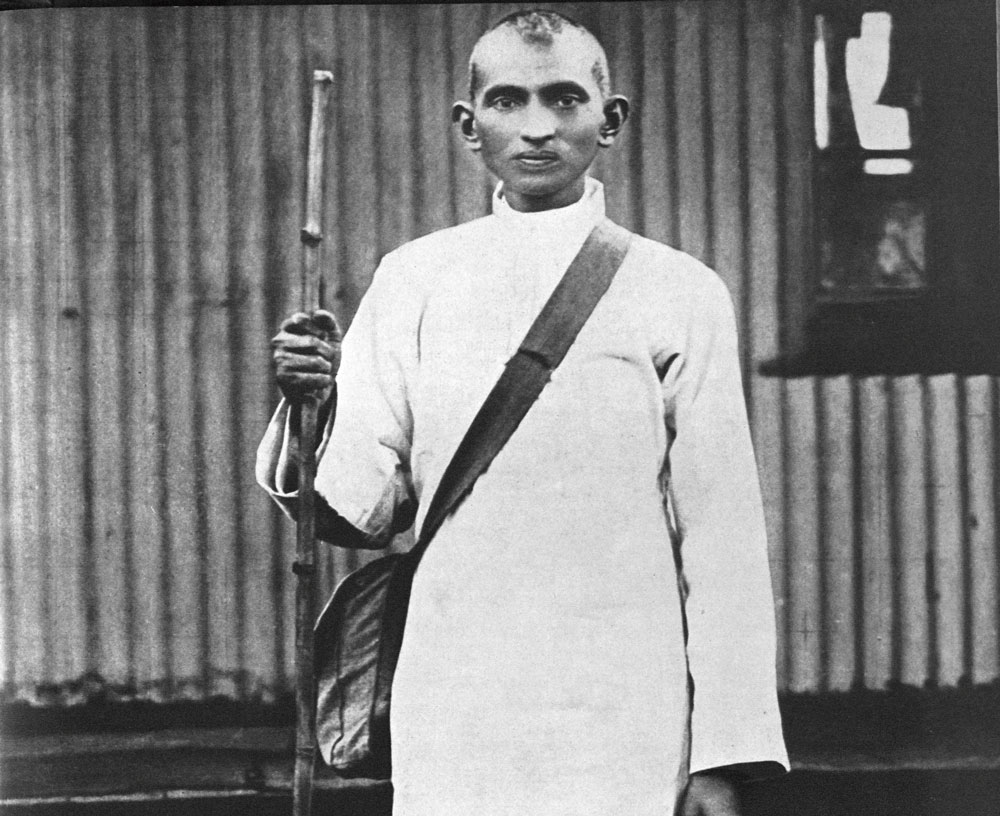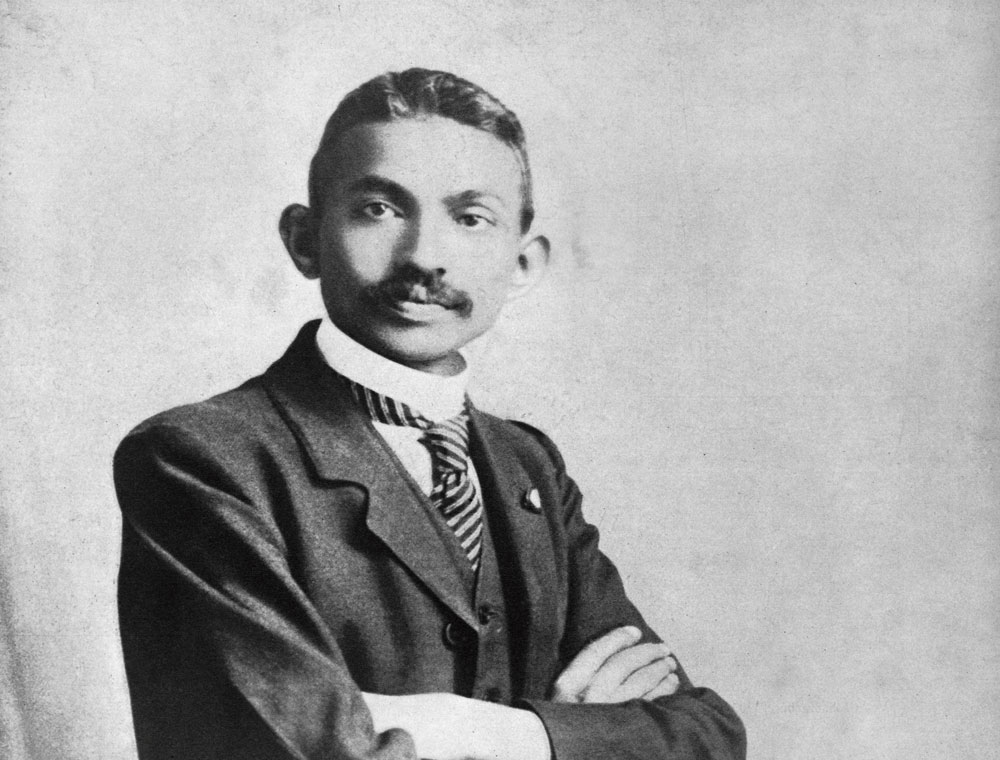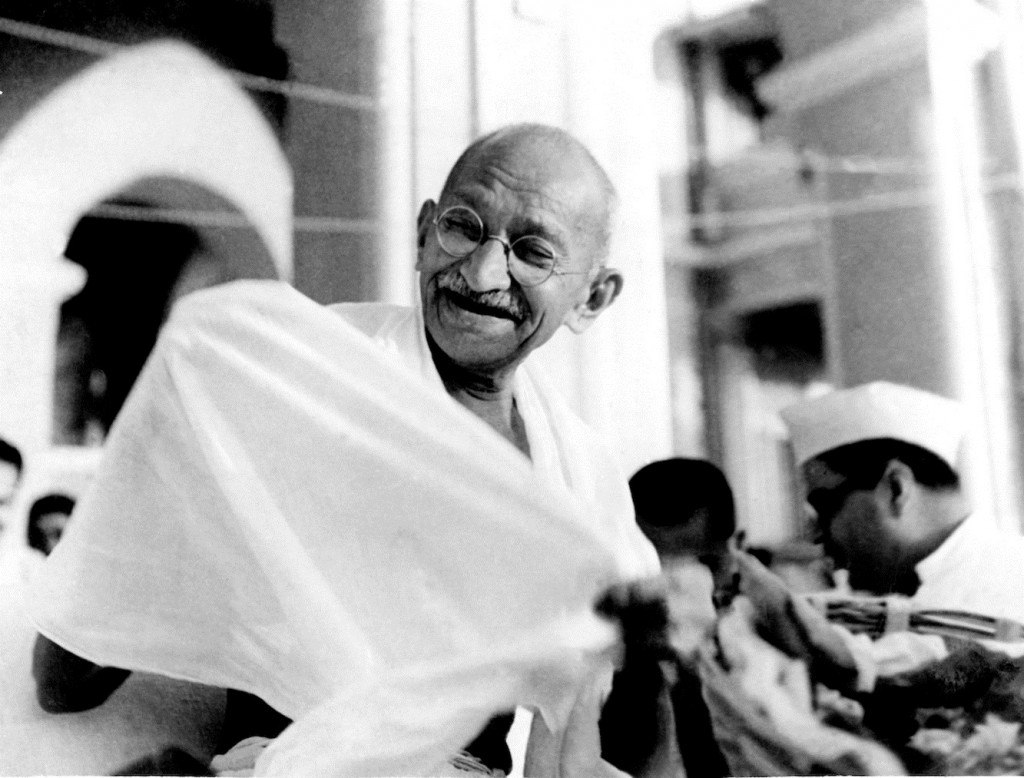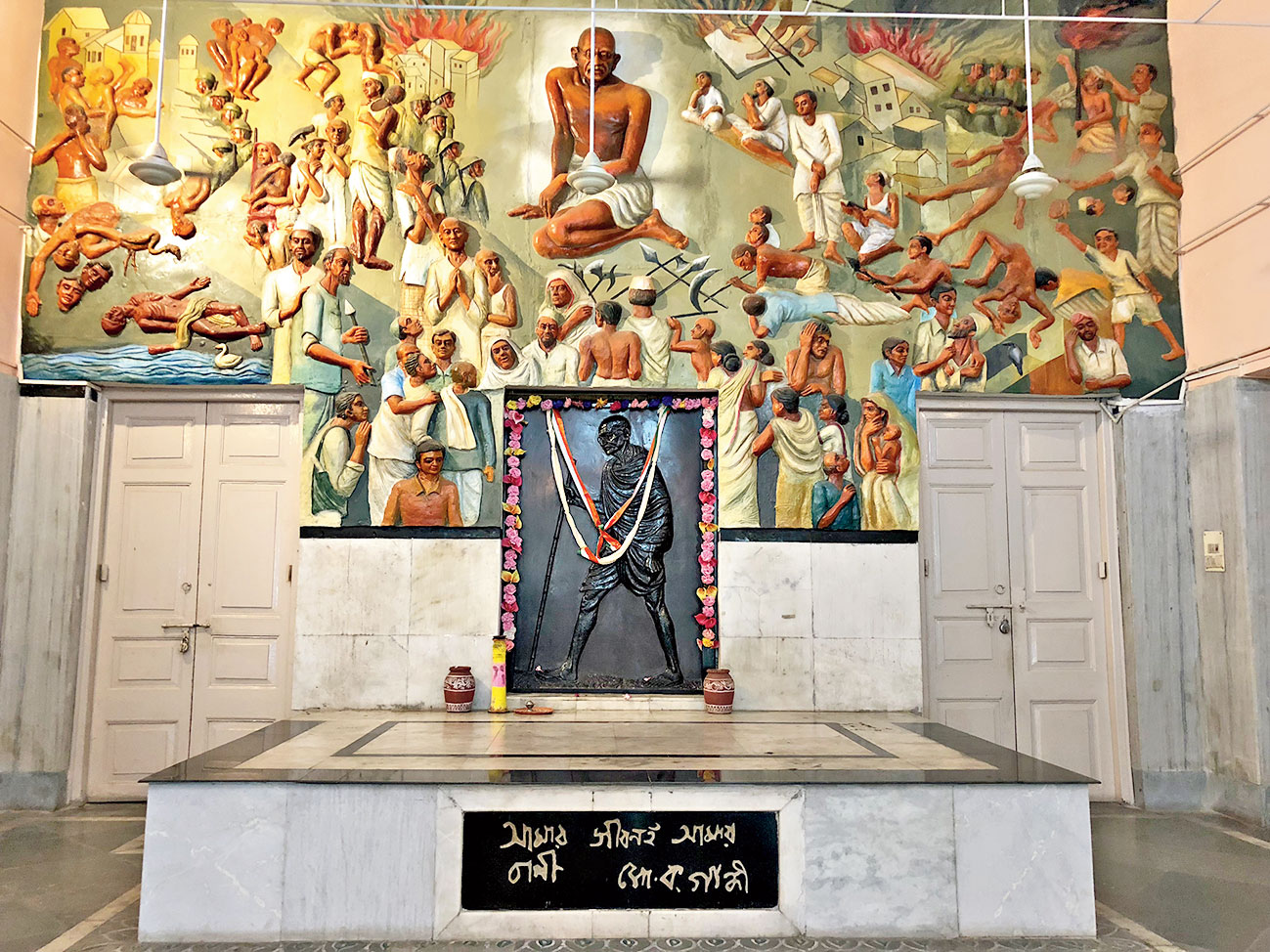
As a Satyagrahi some years later Scanned pic from Mahatma Gandhi - a book by The Publications Division
When I was a child, my parents tried writing my future. They told me that I would become a doctor, have an arranged marriage, and worship Mahatma Gandhi. This was common for first generation Indian migrants to Britain, land-locked in a time capsule of bucolic nostalgia.
The first test of my destiny was when I was nine. My parents made me watch Richard Attenborough’s Gandhi, starring Ben Kingsley. They asked what I thought of the film. I had seen Star Wars the week before, so my standards were exacting. Worried that I would give the plot away, I hesitatingly replied, “Gandhi got shot,” thereby reducing India’s freedom struggle to point blank range.
As a growing lad, coming to terms with my own ethnicity in the land of the former colonialists, I became besotted with Bhagat Singh, the combative freedom fighter who was hung for assassinating a British police officer who had beaten to death Singh’s hero and another freedom fighter, Lala Lajpat Rai. In a fit of adolescent rebelliousness, I sometimes pushed the envelope too far.
“Gandhi should have been more supportive of Bhagat Singh,” I said defiantly.
“Gandhiji, call him Gandhi Jee,” my father scolded. “Saints should be judged guilty until they are proved innocent,” reflected George Orwell about Gandhi. As a youth, Gandhi was no saint. He confessed to refusing to abandon his carnal duties with his wife when his father was literally dying. He confessed to lying, stealing, and smoking — which is tame for most young men, but a tad scandalous for a “Mahatma”.
In The South African Gandhi, two fastidious historians, Ashwin Desai and Goolam Vahed, have uncovered even more evidence that Gandhi was far from a great soul. History is written by those who can be bothered to write it. Desai and Vahed have gone to great troubles to show that Gandhi, who spent several years in South Africa as a young lawyer, was plagued by the same foibles as others in his time. They reveal that Gandhi didn’t think highly of black Africans. He called them “Kaffirs”, a derogatory term, was indifferent to their plight, and wanted them segregated from Indians. He despised their beer, too.
At first, it seems odd that the man who fasted so that Hindu-Muslim riots would end, could be so — and there is no charitable way to say this — racist. However, this would be a superficial interpretation of the scholarship of Desai and Vahed. Their work explains what Nietzsche described as a powerful human emotion — ressentiment, a potent shame that is nurtured in vanity.
Gandhi, as a young man, admired and supported the British. During the Second Boer War, he organised volunteers for the Indian Ambulance Corps. Indeed, he was on the same side as Winston Churchill, who was captured by the Boers, and who would go on to call Gandhi a “seditious Middle Temple lawyer”. That Gandhi, then, identified more with the British than black Africans is a sentiment not uncommon in upper caste Hindus, even today. Gandhi’s reckoning, what may have induced the ressentiment, came when he was thrown off a first-class cabin in a train despite paying for a first-class ticket. Because of the segregation laws in South Africa, only whites could sit in first class. For an educated upper caste Hindu, who rightly thought that he was not inferior to whites, this was a slap on the cheek, and Gandhi refused to turn the other cheek.
It may not have been the suffering of the Blacks and Indians in South Africa which transformed Mohandas to Mahatma, but his personal sleight. Revolutions are often personal. Revolutionaries are bounded by their own vanity and Gandhi expressed his vanity in unconventional ways. His insistence on drinking goat milk, his sartorial thrift, which made Churchill call him a “half-naked fakir”, and his boundless embrace of a contrived poverty that made Sarojini Naidu comment that it cost a lot keeping Gandhi poor, were surrogates of narcissism which could only come from a man who believed that he, and he alone, spoke for India. This did not go unnoticed by Mohammad Ali Jinnah, the debonair leader of the Muslim League, and founder of Pakistan, who saw through Gandhi’s conceit, and refused to join the flock.
The Mahatma was an odd character who set moral standards for others that he failed. He slept naked with women to practice self-control for his celibacy. His celibacy was self-imposed, as it is doubtful that he consulted his wife, Kasturba, who he fatally forbade from taking penicillin for pneumonia because he felt that antibiotics were unnatural. Later, he had no problems taking quinine for malaria.
Even Gandhi’s assassin, Nathuram Godse, a Hindu fundamentalist, was an odd man. Godse was angry with Gandhi because he believed that Gandhi had double standards during the Partition and felt he admonished, selectively, the Hindus for the violence.
The final straw for Godse was when Gandhi fasted so that India give Pakistan the money that was set aside for her, which had been withheld by the Indian government because Pakistan had attacked Kashmir. The Indian government has allowed Godse’s memoirs to be published. Godse had exchanged letters with one of Gandhi’s sons, Ramdas, explaining his actions. The Epistolary, started by Ramdas, is intense but Ramdas remained unconvinced by Godse’s reasons for killing his dad. The two men finally agreed to disagree. True to his father’s legacy, Ramdas asked that Godse not be hung but his request was declined.
Recently, I heard a few Americans admonishing the Founding Fathers for being “slave-owning white males”. I felt their disdain towards the founders was unfair. Some of their practices were, undoubtedly, barbaric by today’s standards, but in many ways the founders were ahead of their times. I then understood why I was ambivalent towards Gandhi. Once I accepted that the Mahatma was no Mahatma, I realised Gandhi was a great man.
He was an imperfect, though not a uniquely flawed, man who united a divided “almost nation”. India, as it exists today, only existed during a few epochs. The British, known for divide and rule, curiously united India. Indians can debate endlessly if the British Raj was a net good for the country, but what can’t be debated is that before the British landed, India was a ragtag of small states — there was no India. Without the British, India might have become another Europe. It is history’s accident that India became a united European super state without a formal referendum.
The greatest misjudgement of Gandhi isn’t that he was a saint, but in failing to recognise that he was a consummate politician — a shrewd self-promoter, a Machiavellian to the core and, not unlike Charles De Gaulle, a nationalist, albeit a more expedient nationalist. Gandhi was no Dalai Lama, but the Dalai is in exile, and Gandhi died in an independent India. It is not his godliness that Indians should worship. It is his pragmatism that they should admire.
Saurabh Jha is Associate Professor of Radiology at the Hospital of the University of Pennsylvania, US. He can be reached @RogueRad
For the British, Gandhi, though pesky, was a godsend as an activist who eagerly went to jail and fasted, but left their affairs untouched. Even as Gandhi was deep in the Quit India movement during World War II, Indian soldiers were fighting for the allies. More Indians have died fighting for Churchill’s “finest hour” than in India’s wars with China and Pakistan.
The narrative that India achieved her freedom because of Gandhi’s non-violence, non-cooperation, and by turning the other cheek, reducing the British to irreparable guilt, is simplistic and untrue. It ignores the underbelly of violence in India’s freedom struggle, such as the Sepoy Mutiny of 1857, the martyrdom of the more impetuous revolutionaries such as Bhagat Singh, and the bloodbath of the Partition.
Why the British really left India will always be controversial. Churchill, the wartime prime minister, had no immediate plans for exit. Many Indians are indebted to the Labour Party as it was Clement Attlee’s government, immediately after the war, that pulled out of India. Their debt to Attlee is misplaced. Britain was in financial tatters after WWII and managing the colonies became untenable, which showed the haste with which the British deserted India — like rats deserting a ship in partial construction. Their speedy exit had consequences. Law and order quickly degenerated because police outposts in cities such as Lahore and Amritsar, which had the bloodiest sectarian violence, were woefully unattended.












